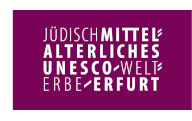Motivation
The unparalleled wealth of preserved original buildings and objects in Erfurt is a boon for the city's history. At the same time, a particular responsibility lies in the appropriate presentation and communication of the relations between Jewish and Christian residents, also in the Middle Ages consistently threatened by violence, destruction and expulsion.
Erfurt considers Unesco's World Heritage List to be an appropriate instrument to raise awareness on the history of its Jewish residents in the Middle Ages, exemplifying the history of ashkenazic (central European) Jewry.
Along with the responsibility arising from this heritage, there are further reasons to strive for the title of World Heritage for the Jewish-medieval heritage:
For years, Unesco has been aiming for the World Heritage List to become more representative, balanced and credible. Thus, proposals representing an underrepresented or so far non-existent type of World Heritage are being treated with priority. Sites addressing Jewish religion and history are to date underrepresented on the World Heritage List, especially considering European Jewry.
When the process of updating the German Tentative List began in 2012, the German Standing Conference of the Ministers of Education and Cultural Affairs (KMK) thus decided to favour proposals from underrepresented categories, too.
The World Heritage title for the Jewish-medieval heritage of Erfurt will therefore contribute to:
- putting regional city history as well as the history of the medieval Jewish community exemplarily into a larger context
- strengthening conservation of the historic monuments and their surroundings in the historic centre of Erfurt
- promoting awareness of regional identity among Erfurters and visitors
- confirming appreciation of the common roots of Jews and Christians in Germany and Europe.
